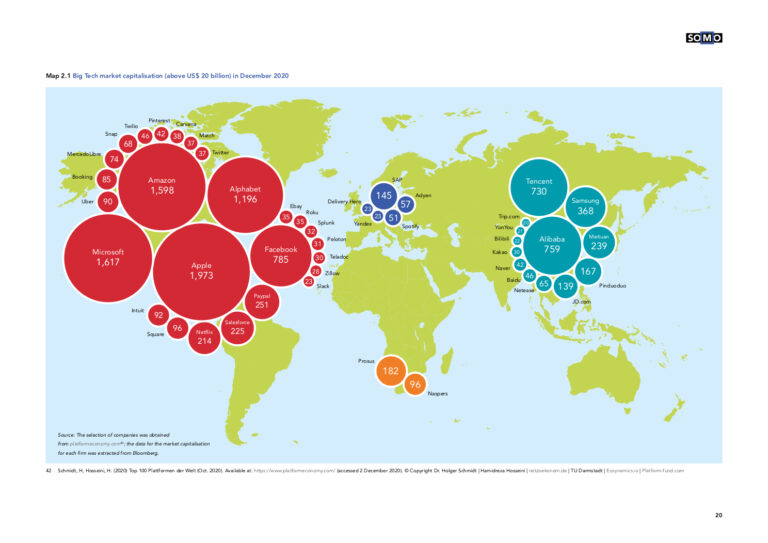
Amazon’s European chokehold
Independent sellers and the economy under Amazon’s monopoly power
This research reveals the immense market power of Amazon in Europe and the revenue it derives from it. In most of Europe’s biggest economies, Amazon is the main route for independent businesses to access online shoppers. Amazon’s dominance allows the company to get away with extractive and exploitative treatment of sellers on its platform.
By analysing Amazon’s corporate structure in Europe, its financial reports, and the findings of competition investigations, SOMO found that:
- In 2022, Amazon raked in €23.5 billion in listing and logistics fees from independent sellers in Europe. This was more than triple the €7.6 billion in 2017.
- To this, Amazon added an estimated €2.75 billion in advertising revenue from independent sellers in 2021. Since 2017, Amazon’s overall European advertising revenue has grown 17-fold.
- Altogether, in 2021 Amazon’s revenue from European sellers amounted to €24.95 billion. Amazon’s European marketplace is so large, if it were spun off into a separate company, the new firm would immediately become Europe’s third-biggest tech company by revenue.
- In this period, Amazon has also continuously increased the price of logistics services. The increases varied, but they could be as high as more than double in some categories.
Amazon in Europe, a dominant platform
“For the past 20 years, Amazon has been expanding its monopolistic hold over online shopping in Europe. It is now so dominant that independent retailers who wish to sell online cannot avoid it. Sellers are locked into the platform and are essentially a captive clientele, making them a profitable source of monopoly rent”, says Margarida Silva, researcher at SOMO.
Amazon argues that the increase in fee revenue results from more sales. However, the numbers the company provides show a slower rise in sales than the increase in the fees that Amazon charged from sellers. Higher sales are only part of the story. In this period, prices for services such as logistics (Fulfillment by Amazon) have been constantly raised, and advertising was made essential to achieve visibility and sales.
Under investigation
Competition authorities across Europe, including in Italy, the EU and the UK, have started probing the company for abuses of its dominance. The EU and Italian investigations show the company used sellers’ data to compete against them and pushed them into buying logistics services. A similar investigation is ongoing in the UK.
In Germany, Amazon has long been the focus of the Bundeskartellamt. Already in 2013, the agency forced the company to remove price parity clauses from its contracts with sellers. It is again investigating whether the company is reproducing the price parity policy via its automated tools.
Amazon Monopoly power
Despite increased scrutiny from competition authorities across the EU, the conflict of interests that lies at the root of Amazon’s monopoly power and wealth has not been addressed.
European competition authorities and policy-makers must either strictly regulate Amazon as a public utility or break up its different businesses to prevent conflicts of interest between its role as a platform intermediary, seller, and service provider.
“To achieve a fair digital transition, European regulators need to break up the excessive market power wielded by corporations like Amazon. Europe needs to sharpen its antitrust tools, revive structural solutions and put them to work”, says Margarida Silva.
Do you need more information?
-

Margarida Silva
Researcher
Partners
-
Balanced Economy Project
Publication
Related content
-
The financialisation of Big Tech Published on:
 Rodrigo FernandezPosted in category:Publication
Rodrigo FernandezPosted in category:Publication Rodrigo Fernandez
Rodrigo Fernandez
-
How Big Tech is becoming the GovernmentPosted in category:Opinion
 Rodrigo FernandezPublished on:
Rodrigo FernandezPublished on: Rodrigo Fernandez
Rodrigo Fernandez -
 Big Pharma raked in USD 90 billion in profits with COVID-19 vaccinesPosted in category:News
Big Pharma raked in USD 90 billion in profits with COVID-19 vaccinesPosted in category:News Esther de HaanPublished on:
Esther de HaanPublished on: -
 COVID-19 pandemic accelerates the monopoly position of Big Tech companiesPosted in category:News
COVID-19 pandemic accelerates the monopoly position of Big Tech companiesPosted in category:News Rodrigo FernandezPublished on:
Rodrigo FernandezPublished on:


